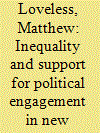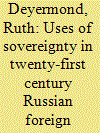| Srl | Item |
| 1 |
ID:
147050


|
|
|
|
|
| Summary/Abstract |
The business sector has strongly influenced Ukrainian electoral campaigns since the founding post-communist elections. This article investigates the role of influential, local business-sector candidates, whom we label ‘boss’ candidates, in illicit campaign activities, using unique biographical, electoral, and crowd-sourced data from the 2012 parliamentary elections. The analysis shows that higher levels of competition among candidates with ‘boss’ characteristics are associated with elevated reports of voter manipulation, specifically vote buying. The findings add to extant research on election integrity in Eastern Europe and Eurasia, presenting quantitative empirical evidence that is consistent with narratives about Ukrainian electoral corruption.
|
|
|
|
|
|
|
|
|
|
|
|
|
|
|
|
| 2 |
ID:
147051


|
|
|
|
|
| Summary/Abstract |
Existing studies of income inequality and political participation—including related literature, for example, on preferences for redistribution—leave us with the question of whether citizens see political democracy as offering ways to challenge market inequalities. Using original surveys in 13 Central and Eastern European countries, I find that those who see high and undesirable levels of income inequality have stronger demands for popular democratic participation than those who do not. In addition, neither the aggregate levels of support for political engagement nor individuals’ perceptions of inequality are coordinated with either national-level indicators of income inequality or democratic performance.
|
|
|
|
|
|
|
|
|
|
|
|
|
|
|
|
| 3 |
ID:
147053


|
|
|
|
|
| Summary/Abstract |
This article seeks to explore the origins and evolution of zachistka (‘cleansing’) and the particular role it played in the second Chechen war of 1999–2005. It argues that zachistka has become part of state, military and media representations of violence, building a psychological environment in favour of war. The article seeks to understand how the propaganda of the Russian Ministry of Defence might have contributed to the perpetuation of war crimes or incitement to atrocity crimes in the region.
|
|
|
|
|
|
|
|
|
|
|
|
|
|
|
|
| 4 |
ID:
147049


|
|
|
|
|
| Summary/Abstract |
Contemporary Russian foreign policy demonstrates a dual approach to state sovereignty, using a Westphalian model of sovereignty outside the former Soviet region and a post-Soviet model inside it. This approach performs three functions in contemporary Russian foreign policy: securing Russian national interests at domestic, regional, and international levels; balancing against the United States; and acting as a marker of ‘non-Western’ power identity in an emergent multipolar order. The conflict between these two models increasingly appears to threaten the last of these objectives, however, and as a means of advancing foreign policy objectives the approach thus appears caught in a self-defeating logic.
|
|
|
|
|
|
|
|
|
|
|
|
|
|
|
|
| 5 |
ID:
147052


|
|
|
|
|
| Summary/Abstract |
The end of World War II brought little relief to the lands it ravaged most. Mass wartime violence continued in the Soviet space beyond the ‘false peace’ of 1945. Historians have sought to explain this violence in terms of the ‘wartime brutalisation’ of state and citizens alike, though this approach is limited in explaining how and why violence continued after 1945. This article shifts focus from psychology to social history to argue that the disintegration of Soviet state control is central to explaining the enduring violence after 1945 and understanding its emergence as much ‘from below’ as ‘from above’.
|
|
|
|
|
|
|
|
|
|
|
|
|
|
|
|